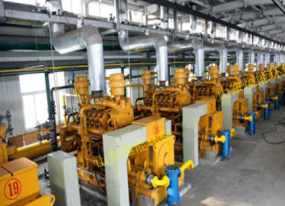沼氣凈化的目的是脫除會(huì)對(duì)后續(xù)流程產(chǎn)生不利影響的雜質(zhì),包括硫化氫和水。
The purpose of biogas purification is to remove impurities, including hydrogen sulfide and water, which will have adverse effects on the subsequent process.
沼氣中含有較多的硫化氫和飽和的水蒸氣,隨著溫度的降低,水蒸氣凝結(jié)成水,與硫化氫分離,對(duì)管道和設(shè)備形成腐蝕;另外,沼氣中的水分凝結(jié),假如管道保溫不好容易在冬季形成管道梗塞,以至?xí)绊戦y門正常運(yùn)轉(zhuǎn)。另外從維護(hù)環(huán)境的角度,硫化氫隨沼氣熄滅產(chǎn)生的二氧化硫會(huì)污染環(huán)境。
Biogas contains more hydrogen sulfide and saturated water vapor. With the decrease of temperature, water vapor condenses into water, which is separated from hydrogen sulfide, causing corrosion to pipes and equipment. In addition, if the water in biogas condenses, it is easy to form pipe blockage in winter if the pipe insulation is not good, which will affect the normal operation of valves. In addition, from the perspective of environmental protection, sulfur dioxide produced by hydrogen sulfide extinguished with biogas will pollute the environment.

脫除沼氣中硫化氫辦法,可采用物理法、化學(xué)法及生物法。物理脫硫法普通采用活性炭法;
Physical, chemical and biological methods can be used to remove hydrogen sulfide from biogas. The physical desulfurization method is usually activated carbon method;
化學(xué)脫硫法中的干法脫硫普通采用氧化鐵脫硫劑,化學(xué)脫硫法中的濕法脫硫普通采濕法888脫硫和絡(luò)合鐵脫硫;生物法主要指的是生物脫硫。詳細(xì)計(jì)劃選擇時(shí)要思索沼氣中硫化氫含量和請(qǐng)求去除程度。
In chemical desulfurization method, iron oxide desulfurizer is commonly used in dry desulfurization, while in chemical desulfurization method, wet 888 desulfurization and complex iron desulfurization are commonly used in wet desulfurization; biological desulfurization mainly refers to biological desulfurization. The content of hydrogen sulfide in biogas and the required removal degree should be considered in the selection of detailed plan.
沼氣脫水主要包括重力法脫水、低溫冷凝法和深度脫水如分子篩等。
Biogas dehydration mainly includes gravity dehydration, low temperature condensation and deep dehydration, such as molecular sieve.
Thank you for reading, hope the above content is helpful to you, if you want to know more wonderful content, please click our official website: biological desulfurization http://m.chinaktws.com .
